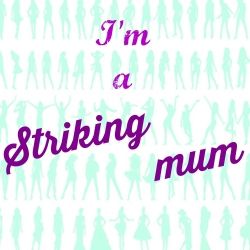1. Have you lost your voice? When and how did that happen?
I lost my voice when my mental health took a turn for the worse, I stopped contacting friends, withdrew into myself and avoided contact with strangers. I was on social media, surrounded by the happiness of others and I had nothing to add to the mix.
2. How do you use your voice? Are you using it for yourself, your family and/or a good cause?
I use my voice now to be open and honest about my depression, I announced my post natal depression to a selection of my Facebook friends - which was really a selfish thing to do, simply so that I could share with any people who might ask and avoid any awkwardness on my part.

A voice doesn't have to be heard for the message to be sent, the online environment is amazing - the #pndfamily on twitter as well as the hashtags enable me to send kind words to other people with similar feelings and in similar situations. Even though we live hundreds of miles apart and all we have physically in common is Twitter, we use our voices and our unique insights.
3. Is there anyone in your life who would prefer you to stay quiet? Why would they want that to happen?
My husband would prefer for me to talk less, I'm sure. For a bit of peace and quiet - I'm quite the chatterbox... Genuinely.
Perhaps, sometimes, we don't need words to express how we feel - and I'm learning the art of hugs.
4. Whose voice do you miss most and why?
I'm not sure how to answer this question, I miss happy Me, the internal monologue who was positive, didn't make me feel bad when I'm in the staff room at lunchtime... Narcissistic? Perhaps a little, but mental illness teaches you about yourself and if you know yourself, you can be more comfortable with who you are and spending time on your own.
5. What do you need to speak up about? Who to? What support do you need to help you do that?
I have started back at work this week - I enjoy my job because I get to use my voice to help people to understand their illness, the treatment and its side effects. But also talking to them in a holistic way - seeing the person, not just their diagnosis.
I have started back on a phased return as arranged my my GP, Occupational Health Dr and my Managers. This phased return should help support me through getting back up to speed at work, and help me to learn when to stand back. As part of this, I need to accept and embrace the fact that my job requires some level of delegation - using my voice to say, 'no, I can't do that right now', and 'please could you do this for me?'
CBT will help me too, teaching me to spot unhelpful thinking styles and how to rationalise when those nasty thoughts of depression creep into my head.
6. Is your inner voice helping or hindering you?
My inner voice has grown up over the last 3 months - it has moved from being desperately sad, empty and self-loathing to only being sad, optimistic and occasional self loathing. This is a HUGE ACHIEVEMENT - and one which I will continue to work on in my therapy sessions.

Glad to read that things are getting slowly better - it does take time doesn't it?
ReplyDeleteVery much so, and when it comes to being 'ill' in this sense, I tell myself that there is plenty of time - sometimes thinking that life is too short just doesn't cut it. Thanks for reading :)
Delete